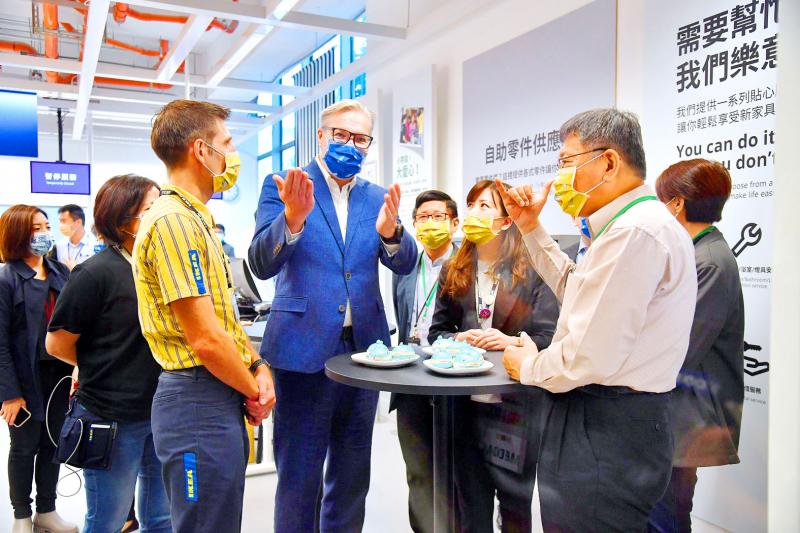Hundreds of people flocked to Swedish furniture retailer IKEA’s new outlet in Taipei’s Neihu District (內湖) yesterday, when the store formally opened, as Taipei Mayor Ko Wen-je (柯文哲) expressed concern about traffic in the district.
The new store covers 6,200 ping (20,496m2) and has the capacity for 9,000 people. It replaced the Dunbei store in downtown Taipei, which had closed two days earlier.
At an inauguration ceremony for the new store, IKEA Group board member Marin Lindstrom said he was delighted that IKEA has found a new home in Neihu after operating at the Dunbei commercial zone for 23 years.

Photo: CNA
He said the Neihu store would provide customers with a more spacious shopping area, as well as more restaurant seating and parking spaces.
Ko, who attended the ceremony along with Taipei Deputy Mayor Huang Shan-shan (黃珊珊), said that Taipei is home to many types of shopping centers and retailers, such as Carrefour of France, Don Don Donki of Japan, local brand A. Mart and IKEA of Sweden.
These stores have changed the commercial appearance of the city and the living habits of its residents, he said.
Ko said that traffic in Neihu is the main concern, adding that he anticipated huge crowds at the new store.
Huang said that the Taipei City Government has prepared traffic control plans for Jiuzong Road, where many retailers are located, including the new IKEA outlet, to cope with the influx of shoppers at weekends and during holidays, as well as those seeking to visit the new store during its two-week inaugural period.
IKEA closed the Dunbei store on the corner of Dunhua N Road and Nanjing E Road on Monday. It was the retailer’s first store in the nation.
One resident, surnamed Lin (林), told the Central News Agency that she had visited the Dunbei store two or three times a week since it opened in 1998, adding that the store was “her psychological support.”
“I live nearby, so I often walked here,” Lin said.
Now that the store has moved away, “I feel not just a big loss, but also panic,” she said.
IKEA has five other outlets — one each in Taoyuan, Taichung and Kaohsiung, and two in New Taipei City.
The company has said it would not rule out plans to open stores elsewhere in Taiwan.

A strong continental cold air mass is to bring pollutants to Taiwan from tomorrow, the Ministry of Environment said today, as it issued an “orange” air quality alert for most of the country. All of Taiwan except for Hualien and Taitung counties is to be under an “orange” air quality alert tomorrow, indicating air quality that is unhealthy for sensitive groups. In China, areas from Shandong to Shanghai have been enveloped in haze since Saturday, the ministry said in a news release. Yesterday, hourly concentrations of PM2.5 in these areas ranged from 65 to 160 micrograms per cubic meter (mg/m³), and pollutants were

Taiwan’s armed forces have established response protocols for a wide range of sudden contingencies, including the “Wan Chun Plan” to protect the head of state, the Ministry of Defense (MND) said today. After US President Donald Trump on Saturday launched a series of airstrikes in Venezuela and kidnapped Venezuelan President Nicolas Maduro, concerns have been raised as to whether China would launch a similar “decapitation strike” on Taiwan. The armed forces regularly coordinate with relevant agencies and practice drills to ensure preparedness for a wide range of scenarios, Vice Minister of National Defense Hsu Szu-chien (徐斯儉) told reporters before a

EVA Airways on Saturday said that it had suspended a pilot and opened an investigation after he allegedly lost his temper and punched the first officer several times as their plane was taxiing before takeoff at Los Angeles International Airport. According to a report published on Thursday by The Reporter, the incident occurred after the flight’s Malaysian first officer tried to warn the Taiwanese pilot, surnamed Wen (文), that he was taxiing faster than the speed limit of 30 knots (55.6kph). After alerting the pilot several times without response, the first officer manually applied the brakes in accordance with standard operating

Japanese Councilor Hei Seki (石平) on Wednesday said that he plans to visit Taiwan, saying that would “prove that Taiwan is an independent country and does not belong to China.” Seki, a member of the Japan Innovation Party, was born in Chengdu in China’s Sichuan Province and became a naturalized Japanese in 2007. He was elected to the House of Concilors last year. His views on the Chinese Communist Party (CCP) — espoused in a series of books on politics and history — prompted Beijing to sanction him, including barring Seki from traveling to China. Seki wrote on X that he intends